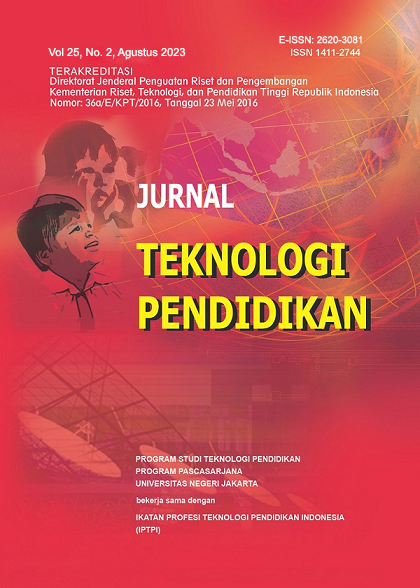The Effect of Digital Literacy on the Risks of Children Dropping Out of School During the Covid-19 Pandemic
DOI:
https://doi.org/10.21009/jtp.v25i2.34477Keywords:
digital literacy, digital access, dropping out of school, multilevel binary logistic regressionAbstract
The Covid-19 pandemic has negative implications for all aspects of life, including aspects of education. It is feared that the transition to a distance learning system (PJJ) that adopts digital technology will reduce students' learning abilities (learning loss) and potentially increase the risk of dropping out of school. This study aims to study the effect of digital literacy on the risk of dropping out of school for children aged 7-18 years during the Covid-19 pandemic. This study used a quantitative approach that using secondary data of Susenas 2021, Podes 2021, and IP-TIK 2021 publications with 250,921 samples of unit analysis being individuals aged 7-18 years with school status in the academic year (2019/2020) at the elementary to high school levels. Data analysis was performed using descriptive methods and multilevel binary logistic regression. The results of the analysis show that digital literacy as a proxy for digital access (use of mobile phones, computers/laptops, and internet access) has a negative significant effect on the risk of dropping out children of school. Childrens that have higher the digital literacy will have the lower the risk of dropping out children of school. The significant control variables were sex, school level, employment status of the head of household, length of schooling of the head of household, household expenditure quintile, and classification of residence. While the contextual (regional) variable that has a significant effect on the risk of dropping out of school is the information and communication technology development index (IP-TIK)
References
Hanushek, E. A., & Woessmann, L. (2020). The Economic Impacts of Learning Losses. OECD Education Working Papers, 225(September), 6–24. https://www.oecd-ilibrary.org/education/the-economic-impacts-of-learning-losses_21908d74-en
Hox, J., Moerbeek, M., & van de Schoot, R. (2010). Multilevel analysis: Techniques and applications: Second edition. In Multilevel Analysis: Techniques and Applications: Second Edition. https://doi.org/10.4324/9780203852279
Jehangir, M., & Ahmed, J. (2021). Children and Youth Services Review Child education in the time of pandemic : Learning loss and dropout. Children and Youth Services Review, 127(October 2020), 106065. https://doi.org/10.1016/j.childyouth.2021.106065
Kemendikbud. (2020a). Data statistik Pendidikan. Kemendikbud. http://statistik.data.kemdikbud.go.id/index.php/page/smk
Kemendikbud. (2020b). Survei Belajar dari Rumah Tahun Ajaran2020/2021.
Okumu, I., Nakajjo, A., Isoke, D., & Archive, M. (2008). Socioeconomic determinants of primary school dropout: the logistic model analysis. Http://Lst-Iiep.Iiep-Unesco.Org/Cgi-Bin/Wwwi32.Exe/[In=epidoc1.in]/?T2000=025423/(100).
Setiawati, M., & Rahmadani, N. S. (2019). Aplikasi Pendidikan Online “Ruang Guru” Sebagai Peningkatan Minat Belajar Generasi Milenial Dalam Menyikapi Perkembangan Revolusi Industri 4.0. Seloka: Jurnal Pendidikan Bahasa Dan Sastra Indonesia, 3(2), 241–246.
Sommet, N., & Morselli, D. (2017). Keep calm and learn multilevel logistic modeling: A simplified three-step procedure using Stata, R, Mplus, and SPSS. International Review of Social Psychology, 30. https://doi.org/10.5334/irsp.90
Sorra, J. S., & Dyer, N. (2010). Multilevel psychometric properties of the AHRQ hospital survey on patient safety culture. BMC Health Services Research, 10(1), 199. https://doi.org/10.1186/1472-6963-10-199
Subiakto, H. (2013). Internet untuk pedesaan dan pemanfaatannya bagi masyarakat. Jurnal Masyarakat, Kebudayaan Dan Politik, Vol. 26(No.4), hal. 243-256.
Unicef. (2021). Menuju respons dan pemulihan COVID-19 yang berfokus pada anak. In Unicef.Org. https://www.unicef.org/indonesia/id/laporan/menuju-respons-dan-pemulihan-covid-19-yang-berfokus-pada-anak
United Nations. (2020). Policy Brief: Education during COVID-19 and beyond. [Resumen de políticas: Educación durante COVID-19 y más allá]. Policy Bried: Education during COVID-19 And, 26, e12.
Yarrow, N., Masood, E., & Afkar, R. (2020). Estimates of COVID-19 Impacts on Learning and Earning in Indonesia: How to Turn the Tide. https://doi.org/10.1596/34378
Yarrowriaz, Noah Bhardwaj, R. (2020). Teknologi pendidikan Indonesia di masa COVID-19 dan selanjutnya. https://blogs.worldbank.org/id/eastasiapacific/teknologi-pendidikan-indonesia-di-masa-covid-19-dan-selanjutnya
Downloads
Published
How to Cite
Issue
Section
License
Jurnal Teknologi Pendidikan is an Open Access Journal. The authors who publish the manuscript in Jurnal Teknologi Pendidikan agree to the following terms.
Attribution-ShareAlike 4.0 International (CC BY-SA 4.0)
-
Attribution — You must give appropriate credit, provide a link to the license, and indicate if changes were made. You may do so in any reasonable manner, but not in any way that suggests the licensor endorses you or your use.
-
ShareAlike — If you remix, transform, or build upon the material, you must distribute your contributions under the same license as the original.
- No additional restrictions — You may not apply legal terms or technological measures that legally restrict others from doing anything the license permits.
Notices:
- You do not have to comply with the license for elements of the material in the public domain or where your use is permitted by an applicable exception or limitation.
- No warranties are given. The license may not give you all of the permissions necessary for your intended use. For example, other rights such as publicity, privacy, or moral rights may limit how you use the material.








